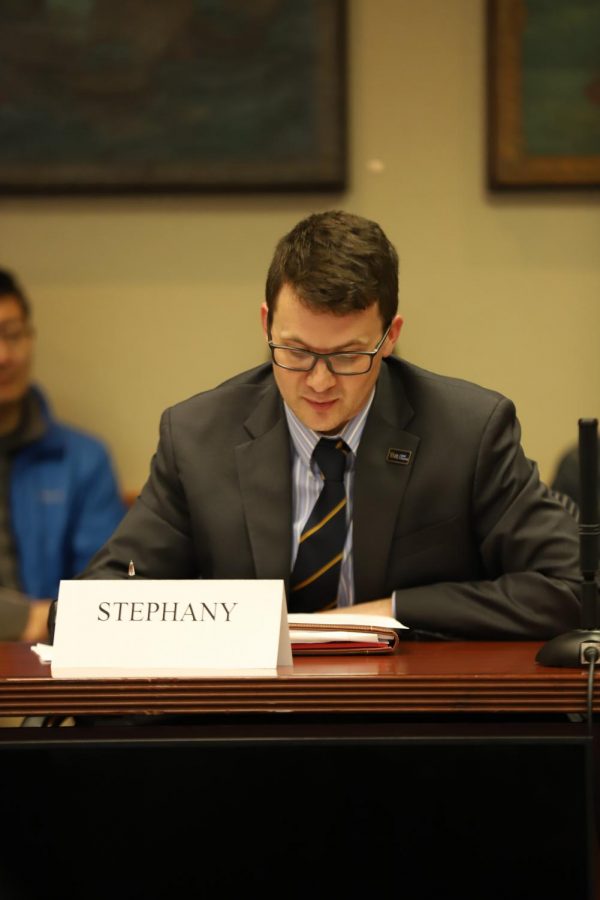Senate Council urges community members to engage with next Plan For Pitt
Kaycee Orwig | Senior Staff Photographer
Andy Stephany, the Staff Council president, reiterated the importance of Pitt community members sharing their opinions on the Plan for Pitt 2025, particularly because the planning process only occurs every five years.
January 16, 2020
Pitt administration entered the new year with a resolution in mind — gathering input from as many people across campus as possible.
Chancellor Patrick Gallagher announced at Thursday’s University Senate Council meeting that Pitt is seeking input from all members of the campus community in generating ideas for the Plan for Pitt 2025, a strategic plan that guides Pitt’s goals for the next five years.
“It was time for us to look forward to the next five years, and that process starts, as it should, with a lot of outreach and idea collection,” Gallagher said. “I really encourage everyone to take advantage of that. We are talking to different schools, student groups, faculty and staff. I don’t want to leave any place unturned.”
The new plan, which will be released over the summer, will build on Plan for Pitt 2016-2020. An 18-person steering committee, led by distinguished professor of law Vivian Curran and Nathan Urban, the vice provost for graduate studies and strategic initiatives, will guide the planning process. Each school within the University has also chosen a planning liaison to aid in the process.
Every member of the Pitt community has the ability to submit a response to the input survey on the Plan for Pitt website. The University will also host Strategic Planning Workshops throughout January to gather further feedback.
Chris Bonneau, the Council president, said the surveys and workshops are a chance to engage in Pitt’s future objectives, which he encourages everyone to take advantage of.
“This is a great opportunity for members of the Pitt community to provide input to the steering committee on the next strategic plan,” Bonneau said. “Please participate in this process. The more voices we have from different areas of the University, the better the result will be.”
Andy Stephany, the Staff Council president, reiterated the importance of Pitt community members sharing their opinions particularly because the planning process only occurs every five years.
“The Plan for Pitt 2025 is setting the stage for confirming the goals established five years ago,” Stephany said. “We as a staff are petitioned to provide feedback about our experiences at the University like never before, and I suspect very few employers offer its employees direct access to shaping the institution’s goals as an entire organization, much less specific details.”
The Council also focused on the new programs announced Thursday addressing sexual misconduct on campus. They include the formation of a new office specifically designed to develop prevention education headed by Carrie Benson, appointment of members to the newly-christened Chancellor’s Advisory Council on the Prevention of Sexual Misconduct, as well as more than $250,000 in grant recipients.
Student Government Board President Zechariah Brown also reported at the meeting that the board is writing a statement alongside the Pennsylvania Association of State-Related Students and an SGB-specific resolution in support of the federal Sami’s Law. Sami’s Law would require ride-sharing apps like Uber and Lyft to display identification marks and barcodes for riders to scan to ensure they are entering the correct vehicle.
New personnel changes were also discussed. Gallagher praised Anantha Shekhar, the new senior vice chancellor for the health sciences and the John and Gertrude Petersen Dean of the School of Medicine, who will start in June.
“There’s no perfect training for this position, so we were looking for someone who came with the right mindset to learn and advance the health sciences,” Gallagher said. “Anantha’s known as both a big-vision person, but with a remarkable capacity to bring people together.”
The Council also welcomed Stephen Jacobus as the new chair of the SGB Judicial Committee and Shelome Gooden as the vice chancellor of research for the humanities, arts, social sciences and related fields. Rob Rutenbar, senior vice chancellor for research, said Gooden’s position is an innovative look at extending research beyond STEM.
“This is a rising concept for a position in research organizations that have been traditionally thought of as STEM-centric to make sure that the full intellectual breath of scholarship is represented, especially given all the intersectional opportunities with the humanities and arts crossing over to things like big data,” Rutenbar said.



